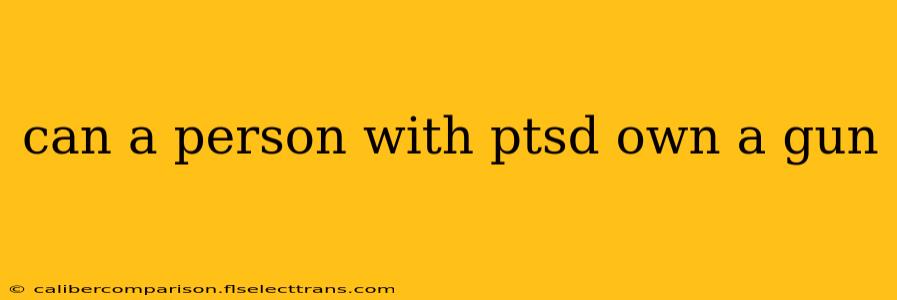Can a Person with PTSD Own a Gun? Navigating the Complexities of Firearms and Mental Health
The question of whether someone with PTSD can own a gun is complex, multifaceted, and evokes strong emotions on all sides. There's no simple yes or no answer, as the legality and ethical considerations depend on numerous factors, including the individual's specific circumstances, the severity of their PTSD, and the applicable laws in their jurisdiction. This article aims to explore these complexities, offering a balanced perspective on this sensitive issue.
Legal Aspects: A Patchwork of Regulations
Federal law in the United States doesn't automatically disqualify individuals with PTSD from owning firearms. However, the situation becomes considerably more nuanced when considering state-specific regulations and the criteria for involuntary commitment. Many states have laws prohibiting firearm ownership for individuals adjudicated mentally ill or deemed a danger to themselves or others. The interpretation of "mentally ill" varies significantly across states, leading to inconsistencies in application.
The Crucial Role of Adjudication and Commitment
It's critical to understand that simply having a diagnosis of PTSD doesn't automatically bar someone from owning a firearm. The key factor is whether the individual has been legally adjudicated as mentally ill and prohibited from owning a firearm through a court order. This process typically involves a formal evaluation by mental health professionals and a court hearing. Involuntary commitment to a mental health facility can also result in firearm restrictions, depending on the state and the nature of the commitment.
Self-Reporting and Responsible Gun Ownership
Many individuals with PTSD successfully manage their condition and lead responsible lives, including owning firearms safely and legally. However, honesty and self-awareness are crucial. If an individual with PTSD experiences symptoms that impair their judgment, impulse control, or poses a risk to themselves or others, they have a moral and potentially legal obligation to refrain from owning firearms. This might involve voluntarily relinquishing their firearms or seeking appropriate treatment.
The Ethical Considerations: A Matter of Safety and Responsibility
Beyond the legal aspects, ethical considerations play a significant role. Responsible gun ownership necessitates a high degree of self-awareness, impulse control, and an understanding of safe firearm handling practices. The intensity and nature of PTSD symptoms can significantly impact these critical aspects. Individuals with PTSD must honestly assess their ability to safely handle firearms, considering the potential risks to themselves and others.
Seeking Professional Guidance
Navigating the legal and ethical complexities surrounding firearm ownership and PTSD necessitates seeking guidance from qualified professionals. A mental health professional can provide an assessment of an individual's condition and capacity for safe firearm ownership. Consulting with a legal professional specializing in firearms laws is also advisable to ensure compliance with all applicable regulations.
Conclusion: A Case-by-Case Assessment
The question of whether someone with PTSD can own a gun doesn't have a universal answer. It requires a careful consideration of legal regulations, the individual's specific circumstances, the severity of their PTSD, and their ability to handle firearms responsibly. Prioritizing safety, both for the individual and the community, remains paramount. Open communication with mental health and legal professionals is crucial for navigating this sensitive and complex issue responsibly.

